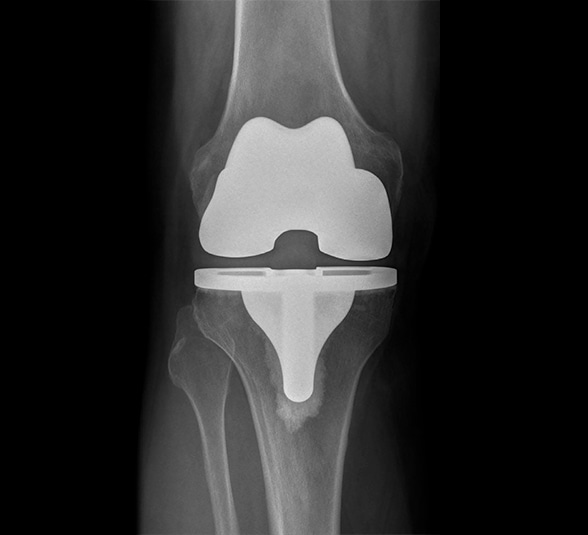Sept. 18, 2018
Mayo Clinic offers customized prostheses for select patients who need total knee replacement. Each implant has a unique design, based on a CT scan of the patient's knee. Algorithms convert the scan to a 3D model by mapping the contours of the bone and correcting areas damaged by the disease process.
"A customized implant can function more like a patient's own knee because it works in unison with the patient's ligaments and tendons. With an off-the-shelf implant, we have to make compromises to get the soft tissues to work with an implant that isn't the same size or, more importantly, the same shape as the patient's natural bone," says Henry D. Clarke, M.D., an orthopedic surgeon at Mayo Clinic in Phoenix, Arizona, who helped develop the customized system.
The customized implants are designed for people who wish to remain active. "We use them in patients who want to do vigorous physical activity, such as tennis or downhill skiing. As with other knee prostheses, we don't advise high-impact activities such as basketball or soccer afterward," Dr. Clarke says.
Customized knee prostheses are costlier than some conventional knee replacements. In addition, design and production of a custom component can take six weeks; conventional implants are available immediately. Dr. Clarke notes that both of these factors currently restrict the wide use of customized knee prostheses.
Mayo Clinic offers the customized option, in addition to traditional knee replacement, as part of its commitment to improving patient satisfaction. Although conventional knee prostheses provide good outcomes in the aggregate, some patients experience persistent pain or restricted movement.
"At Mayo, our goal is to expand the good results we get in general with knee replacement surgery and reduce the segment of the patient population who feel that things just aren't quite right following knee replacement," Dr. Clarke says. "We want to achieve results with knee replacement akin to those we see with hip replacements, where patients are able to forget that they have a prosthetic joint."
Custom knee prosthesis

Custom knee prosthesis
X-ray of a custom knee prosthesis demonstrates the asymmetry in the offset of the femoral component medially and laterally, apparent from the difference in the polyethylene thickness between the femoral and tibial components.
Unlike a conventional knee prosthesis, a customized knee prosthesis is often asymmetrical, with different medial and lateral dimensions — mimicking variability in the patient's anatomy. Published research has demonstrated that customized total knee arthroplasty improves kinetic function. A study published in the April 2017 issue of the Journal of Arthroplasty used mobile fluoroscopy to analyze tibiofemoral kinematics in patients with customized and conventional knee implants. "This study indicated that when patients are climbing steps or squatting, the customized prosthesis functions more like a normal knee," Dr. Clarke says.
"The outcomes we see at Mayo are favorable," he adds. "Patients with a customized knee replacement do at least as well as I would expect with a conventional knee replacement, and many of them are among my happiest patients after surgery."
Disclaimer
Dr. Clarke reports receiving royalties and consulting payments from Conformis to help design and commercialize these total knee replacement prostheses.
For more information
Zeller IM, et al. Customized versus patient-sized cruciate-retaining total knee arthroplasty: An in vivo kinematics study using mobile fluoroscopy. Journal of Arthroplasty. 2017;32:1344.